Do you want to nurture creativity and imagination in your little one? Are you looking for fun and engaging ways to encourage pretend play? How can dramatic play ideas help your child develop social, emotional, and cognitive skills?
Dramatic play ideas are among the most powerful tools for fostering creativity in young children. It offers them a space to explore new roles, express emotions, and develop their problem-solving abilities while having fun. Incorporating imaginative scenarios into your daily routine can help your child better understand the world around them.
In the following article, we’ll find the many benefits of children’s dramatic play and offer creative dramatic play ideas and tips on fostering a rich, engaging environment for kids.
What is Dramatic Play?
Dramatic play, also known as pretend play or role play, is an activity in which children use their imaginations to simulate real or fictional scenarios. It can include activities like acting out a profession (doctor, teacher, firefighter), mimicking social roles (parent, sibling), or constructing entirely fictional worlds (superheroes, pirates, fantasy creatures). Dramatic play ideas can be a solo or group activity involving physical movement, verbal expression, and props or costumes.
In dramatic play, children often take on roles and act out stories or experiences they have seen, heard, or imagined. This allows them to explore different perspectives, express emotions, and practice social norms and behaviors. For example, when children pretend to be parents, they may mimic caregiving activities, which helps them understand empathy and responsibility.
What are the Types of Dramatic Play?
Dramatic play is generally categorized into two primary types based on how guided or open-ended the experience is: Structured and Unstructured. Both types are essential in early childhood development and offer distinct benefits to a child’s learning journey.
Structured Dramatic Play
Structured dramatic play refers to adult-guided, theme-specific, or goal-oriented pretend play experiences. In this type of play, children are provided with specific roles, props, rules, or objectives to follow. It is commonly used in classroom settings to meet targeted learning outcomes.
Key Features:
- Often aligned with curriculum goals (e.g., a hospital to learn about community helpers).
- Involves adult facilitation or direction.
- May include scripted elements or planned tasks.
- Focuses on specific vocabulary, routines, or skills.
Examples:
- A “Post Office” play setup with labeled envelopes, delivery logs, and assigned roles.
- Reenacting a story like The Three Little Pigs with props and guided dialogue.
- A teacher-led “Restaurant” where children follow a menu, take orders, and practice counting money.
Educational Benefits:
Structured play enhances language acquisition, social routines, role comprehension, and supports cross-curricular learning in subjects like math, science, or social studies.
Unstructured Dramatic Play
Unstructured dramatic play is child-initiated, spontaneous, and open-ended, allowing children complete freedom to create their own stories, roles, and worlds. This is the most natural and intuitive form of play, especially in home or free-choice classroom environments.
Key Features:
- Driven entirely by the child’s imagination and interest.
- Lacks fixed goals, rules, or teacher-imposed scripts.
- Props and materials may be improvised or symbolic.
- Often fluid and adaptable, roles can change at any time.
Examples:
- A child pretending a stick is a magic wand while becoming a wizard in the backyard.
- Siblings are creating a pretend school with stuffed animals as students.
- Free play where costumes, pillows, or boxes become part of a made-up world.
Educational Benefits:
Unstructured play strengthens creativity, problem-solving, emotional expression, and flexible thinking. It encourages independence and allows children to process real-life experiences symbolically.
Benefits of Dramatic Play
Dramatic play ideas are more than just fun; they are key components in a child’s developmental journey. Some of the primary benefits include:
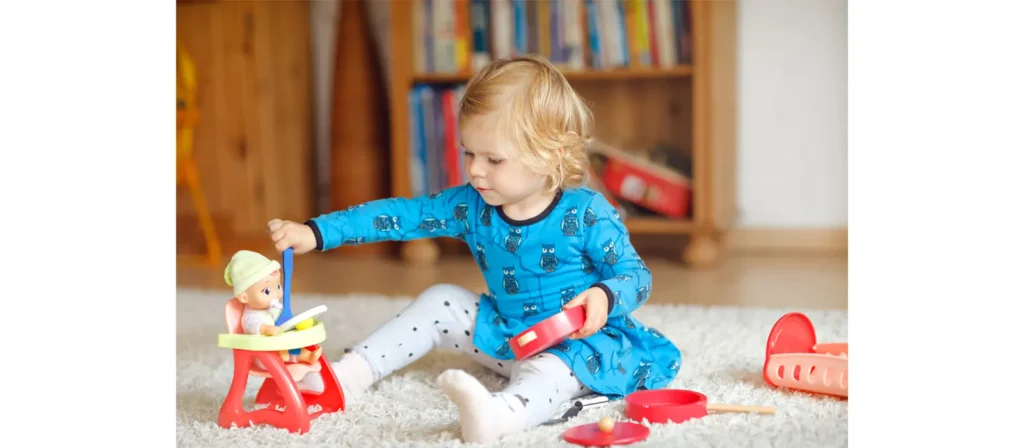
1. Cognitive Development
- Problem-Solving Skills: When children engage in dramatic play, they often encounter problems that require creative solutions. For example, if they’re pretending to run a restaurant, they’ll need to figure out how to seat customers, take orders, and deliver food. This boosts their ability to think critically and solve problems.
- Memory and Recall: Pretend play is an excellent tool for strengthening memory. As children act out familiar scenarios, they use dramatic play costumes and props to simulate stories or real-life experiences, reinforcing their short-term and long-term memory.
- Abstract Thinking: Dramatic play in a child development center encourages symbolic thinking. A simple stick could become a sword, a box could transform into a spaceship, and a blanket could turn into a cape. This abstraction helps children develop their imagination and creativity.
2. Social and Emotional Development
- Empathy and Perspective-Taking: Through role-playing, children step into the shoes of others. For example, when children act as parents or teachers in their children’s dramatic play, they gain an understanding of different emotions and behaviors. They learn empathy by imagining how others might feel and how to respond in various social situations.
- Emotional Regulation: Dramatic play ideas often involve acting out emotions, like pretending to be scared, sad, or excited. This provides children with a healthy outlet for emotional expression and helps them understand how to regulate their feelings in real life.
- Social Skills: When children engage in group dramatic play, they practice communication, cooperation, negotiation, and conflict resolution. These skills are crucial for building friendships and navigating social situations.
3. Language Development
- Vocabulary Expansion: Through dramatic play, children are introduced to new words and phrases, particularly those related to specific roles or settings, such as “customer,” “order,” “menu,” or “emergency.” The frequent use of new vocabulary helps solidify language skills.
- Storytelling and Narrative Skills: Pretend play helps children understand how to structure a story with a beginning, middle, and end. It fosters creativity in constructing new scenarios and narratives, improving storytelling skills.
- Communication: Dramatic play ideas encourage verbal expression, as children need to communicate their thoughts, ideas, and plans with peers during role-play. This enhances their ability to articulate their thoughts and engage in meaningful conversations.
4. Motor Development
- Gross Motor Skills: Inactive forms of dramatic play, children might run, jump, climb, or dance, developing their large muscle groups.
- Fine Motor Skills: Handling dramatic play toys like small objects, dressing up in dramatic play costumes, or arranging props helps refine fine motor skills. These activities also improve dexterity and hand-eye coordination.
How to Encourage Dramatic Play at Home or in Preschool
Dramatic play ideas in the home or classroom require creating an environment that encourages imagination and role-taking. Here are some strategies:

Setting Up Play Spaces
Create designated areas where children can engage in dramatic play. A cozy corner with costumes, props, and themed items like kitchen utensils, tools, or dolls can spark creativity. For instance, a space with a small table and chairs, pretend food, and menus can turn into a restaurant for the children to run.
Provide Open-Ended Materials
Children don’t need expensive toys to engage in dramatic play. Provide open-ended materials such as cardboard boxes, old clothes, fabric, kitchen utensils, and non-breakable household items. These materials encourage children to use their creativity to invent their own scenarios.
Examples of Open-Ended Props:
| Everyday Items | Dramatic Uses |
|---|---|
| Scarves | Costumes, capes, picnic blankets, and royalty accessories |
| Cardboard Boxes | Spaceships, kitchens, castles |
| Wooden Spoons | Microphones, magic wands, drumsticks |
| Old Phones | Business play, doctor office, interviews |
Be an Encourager, Not a Director
While it’s important to encourage dramatic play, avoid taking over or directing the play. Children should be free to explore their imagination without too much adult intervention. If necessary, gently guide them by asking open-ended questions, encouraging them to think creatively, like “What do you think the doctor would do next?” or “How can we solve this problem together?”
Introduce Simple Themes and Scenarios
If kids need a little help getting started, introduce simple, relatable themes like:
- Going to the doctor
- Grocery shopping
- Running a bakery
- Exploring outer space
- Visiting a zoo
These themes are familiar, easy to role-play, and packed with language development and problem-solving opportunities.
Model Dramatic Play
Adults can also model dramatic play ideas to show children how it works. By pretending to be characters or engaging in role-play with them, adults can demonstrate how to incorporate new ideas into play.
Provide Opportunities for Group Play
Dramatic play can be an individual activity, but it is even more enriching when children collaborate. Encourage group play by organizing play dates or classroom activities where children can collaborate and share roles. This fosters social interaction and communication skills.
Rotate Props to Keep Things Fresh
To maintain excitement and curiosity, regularly rotate toys and props. When a firefighter hat disappears for a while and comes back later, it suddenly feels new again. This trick helps prevent boredom and reinvigorates play with little effort.
Celebrate the Process, Not the Product
Unlike crafts or puzzles, dramatic play is about the experience, not the result. There’s no right or wrong way to pretend. So instead of focusing on performance or completion, celebrate creativity, collaboration, and the pure joy of imaginative play.
26 Creative Dramatic Play Ideas
Dramatic play allows children to immerse themselves in different roles, explore their creativity, and practice real-world skills. To inspire imaginative play, children will love some dramatic play ideas!
1. Pretend Play Kitchen Dramatic Play Ideas
- Use a small table as a kitchen counter, cardboard boxes as stoves or refrigerators, and plastic plates and utensils for pretend meals.
- Provide empty containers, measuring cups, and toy baking tools for pretend cooking and baking.
- Add aprons and chef hats for role-playing, create a pretend menu, and label different areas like the “sink” and “fridge.”
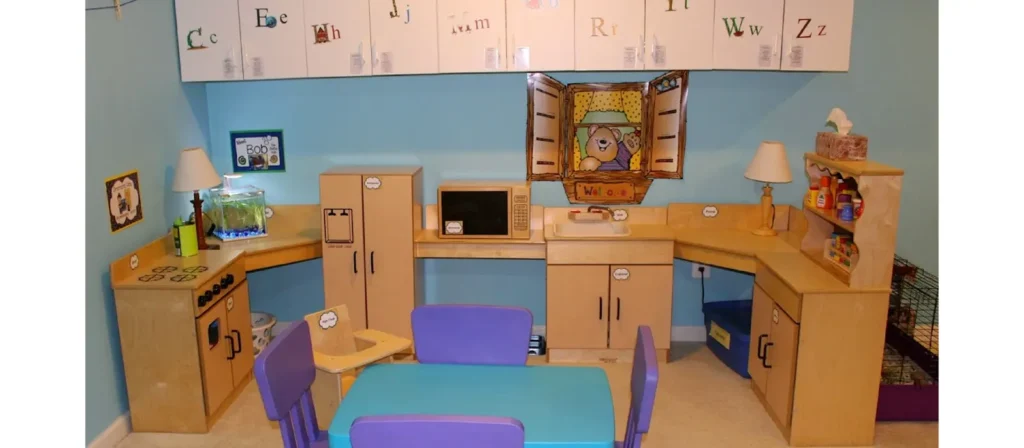
Educational Value:
Pretend kitchen play enhances cognitive sequencing and symbolic thinking as children plan and prepare imaginary meals. It supports language development by encouraging the use of cooking-related vocabulary and conversational role-play. Fine motor skills are strengthened through the manipulation of utensils, containers, and tools. Additionally, it nurtures social cooperation, responsibility, and turn-taking during collaborative scenarios.
2. Flower Shop Dramatic Play Ideas
- Use colorful artificial flowers, tissue paper flowers, or even real plants. Set them up in vases or baskets.
- Label the flowers with prices and create a sign that says “Flower Shop.” This helps kids practice reading and learning about money.
- Provide toy gardening tools so children can “arrange” bouquets and gift-wrap them for customers.
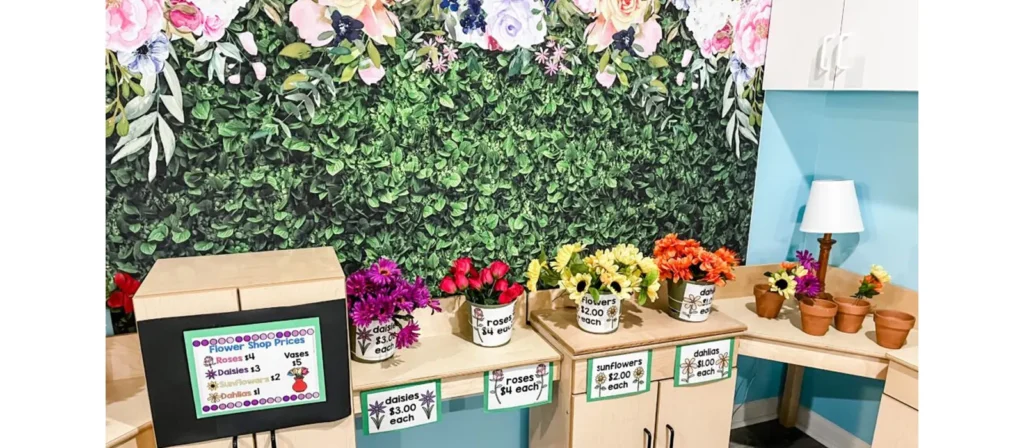
Educational Value:
This activity fosters creativity, pattern recognition, and basic numeracy through arranging, labeling, and “selling” floral products. Children expand their vocabulary related to colors, flowers, and emotions, while also engaging in social interaction through customer role-play. It introduces early business concepts, such as pricing and transaction exchange, and refines fine motor coordination with hands-on floral work and gift-wrapping tasks.
3. Space Dramatic Play Ideas
- Use cardboard boxes or blankets to build a pretend rocket ship. Children can take turns being astronauts, mission controllers, or alien explorers. This idea encourages imagination, problem-solving, and social interaction.
- Provide children with “space gear,” such as helmets, telescopes, and space maps. They can embark on missions to explore new planets, meet alien species, and discover new worlds while learning about teamwork and exploration.
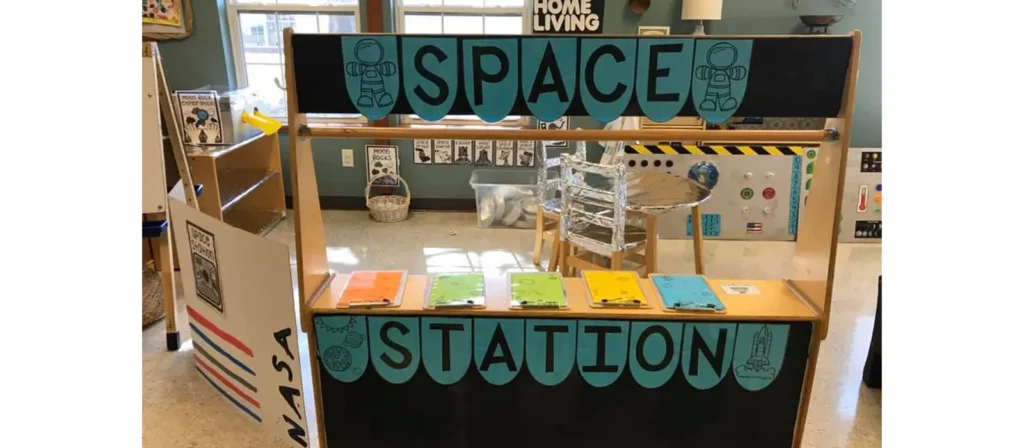
Educational Value:
Space-themed dramatic play encourages abstract thinking, spatial reasoning, and early scientific inquiry as children explore planets, stars, and missions. It builds vocabulary related to astronomy and space exploration while strengthening collaboration through team-based roles such as astronauts, engineers, and aliens. This type of imaginative play nurtures curiosity, narrative development, and cognitive flexibility.
4. Grocery Store Dramatic Play Ideas
- Customer and Cashier Roles: One child can play the customer, shopping for groceries, while another can act as the cashier, ringing up items and handling money. This helps children practice communication, math, and social skills.
- Shopping List: Give children a shopping list with pictures or names of items they need to buy. This will encourage them to identify and locate items while they practice reading and sorting.
- Stocking the Shelves: Children can take turns stocking shelves with products as store workers. This teaches organization and responsibility.
- Bagging and Checkout: After “shopping,” children can practice bagging their groceries and using a cash register, developing motor skills and understanding transaction processes.
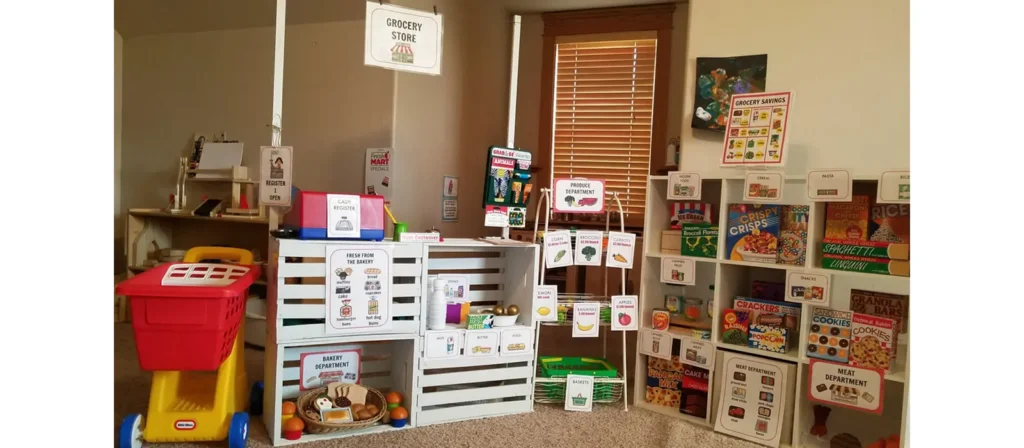
Educational Value:
A pretend grocery store provides meaningful opportunities for children to practice counting, sorting, and categorizing food items, reinforcing early math and cognitive organization. Functional literacy is supported through reading shopping lists, price labels, and store signage. Children also develop social-emotional competencies such as patience, cooperation, and problem-solving through realistic customer-cashier interactions.
5. Post Office Dramatic Play Ideas
- Set up a small table as the post office counter. Use a box or basket representing the mail tray and a chair behind the counter for the “postal worker.”
- Provide envelopes, postcards, and small packages. You can even make “letters” using paper or cardboard and label them with different addresses.
- Use stickers or stamps to represent postage. Children can “stamp” letters and packages to practice fine motor skills.
- Include accessories like a pretend cash register, postman’s bag, or mail sorting bins. You can also use a toy phone to take calls or make deliveries.

Educational Value:
Post office play encourages emergent writing, print recognition, and meaningful literacy experiences as children create and deliver mail. It develops fine motor control through stamping, sorting, and envelope handling, while fostering language growth through the use of addressing, labeling, and messaging. This setting also introduces the role of postal workers and builds awareness of community helpers and communication systems.
6. Superhero Dramatic Play Ideas
- Provide capes, masks, and shields for children to dress up as their favorite superheroes. You can also create training exercises, such as obstacle courses, agility tests, or missions to save the world. These activities promote physical activity, problem-solving, and teamwork.
- Set up a “Mission Control” station where children can plan their superhero missions and track their progress using walkie-talkies, maps, and mission logs. This encourages teamwork, communication, and creative storytelling.

Educational Value:
Superhero role-play supports moral development as children explore ideas of fairness, courage, and helping others. It encourages expressive language and narrative thinking through mission-based storytelling. Gross motor skills are enhanced through active movement, while teamwork and leadership are developed in cooperative “rescue” scenarios.
7. Construction Zone Dramatic Play Ideas
- Set up a construction zone where children can “build” houses, roads, and other structures using blocks or toy construction tools. Children can pretend to be construction workers, architects, or engineers, learning about shapes, measurements, and engineering concepts.
- Provide children with construction hats, tool belts, and safety goggles. This allows them to take on the roles of builders or safety inspectors while emphasizing safety and responsibility.

Educational Value:
Construction-themed play introduces basic engineering principles and spatial awareness as children build and design structures. It strengthens problem-solving and planning abilities while developing gross and fine motor coordination through the use of tools and materials. Social interaction, turn-taking, and cooperation are also reinforced in shared building tasks.
8. Garden Dramatic Play Ideas
- Set up a small area with artificial flowers, pots, and pretend soil (using brown fabric or paper). Label sections for different types of plants, like “Flowers” or “Vegetables.” Children can pretend to be gardeners, planting flowers, watering plants, and caring for their garden. They can also learn about different plants as they “grow” their garden.
- Provide child-sized gardening tools, watering cans, and gloves. You can also use small baskets or bags for “harvesting” plants.
- If space allows, create a small “market” where children can pretend to sell their plants or flowers, with pretend money and price tags.
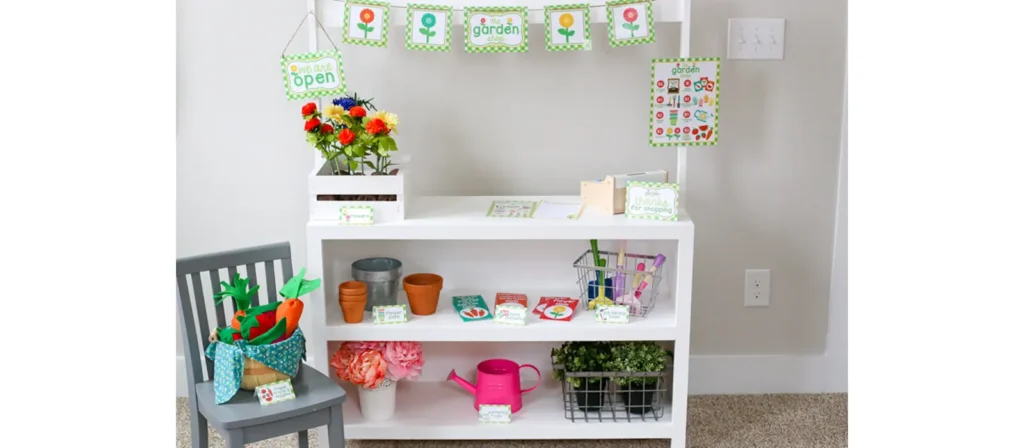
Educational Value:
Gardening activities nurture responsibility, patience, and an appreciation for nature through role-play focused on planting, watering, and harvesting. Children enhance their understanding of plant life cycles and environmental care while building fine motor skills through digging, pouring, and handling tools. The setting encourages classification, sensory exploration, and early science concepts.
9. Hospital or Doctor’s Office Dramatic Play Ideas
- Provide toy stethoscopes, bandages, and doctor’s coats for children to pretend they are doctors and nurses. They can care for sick dolls or stuffed animals, learn about medical procedures, and take on patient or caregiver roles.
- Set up a “hospital emergency room” scenario where children act as doctors, nurses, and patients. This promotes empathy, responsibility, and a basic understanding of healthcare.
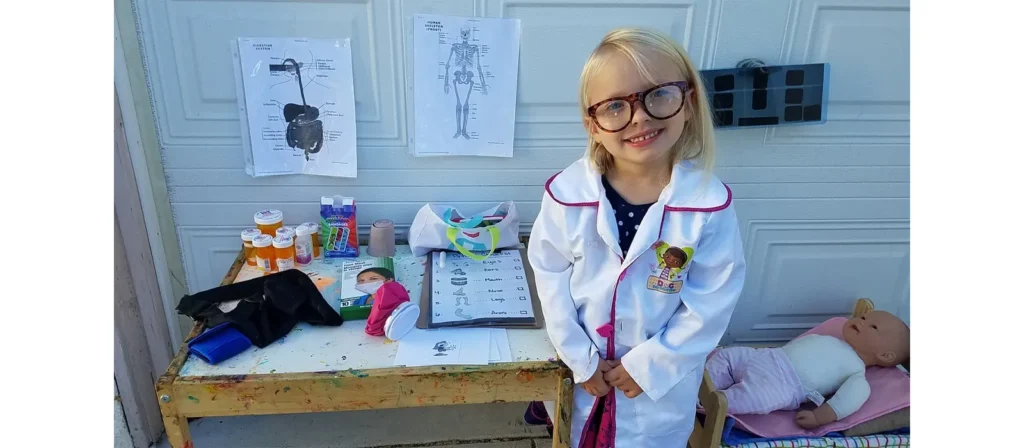
Educational Value:
Playing doctor allows children to explore health, hygiene, and empathy by caring for patients and learning about the human body. Medical vocabulary is introduced and reinforced, while expressive language is practiced through diagnosis and treatment dialogue. Fine motor control is developed through detailed actions like bandaging or using instruments, and children gain awareness of community health roles.
10. Farm Dramatic Play Ideas
- Create a farm environment with toy animals (or real stuffed animals) and pretend farm tools, like a watering can or pitchfork. Children can play the role of farmers, tending to animals, planting crops, and managing a farm.
- Children can set up a pretend farm stand to “sell” their goods (fruits, vegetables, eggs). This encourages learning about farming, economics, and responsibility.

Educational Value:
Farm play introduces children to agricultural processes, animal care, and the farm-to-table concept, supporting science and environmental learning. Children develop social-emotional skills like patience, responsibility, and nurturing behaviors. They also expand vocabulary related to farm tools, animals, and produce while engaging in rich role-play scenarios.
11. Restaurant and Café Dramatic Play Ideas
- Set up a table with place settings, menus, and notepads for taking orders.
- Offer aprons and hats for waitstaff and chefs, and create a pretend kitchen nearby.
- Add signs like “Open” or “Closed” and pretend money for transactions.
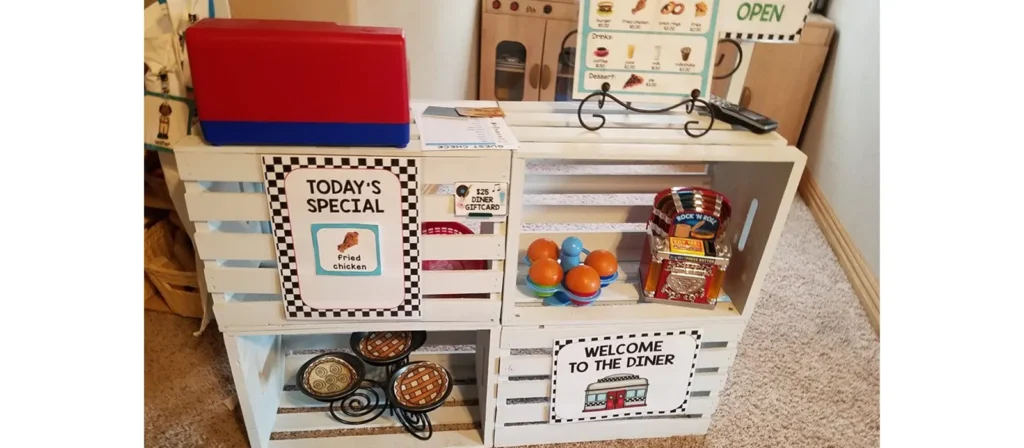
Educational Value:
Running a pretend restaurant fosters sequencing, memory, and communication as children take orders, serve food, and handle “payments.” It strengthens early math skills through menu prices and reinforces polite social exchanges. Motor skills are enhanced via serving and food preparation, and collaboration is nurtured through shared roles and responsibilities.
12. Animal Hospital Dramatic Play Ideas
- Arrange plush animals on tables or blankets as “patients” needing care.
- Include toy syringes, thermometers, and pet carriers for examination and treatment.
- Label stations like “check-in,” “surgery,” and “recovery room.”
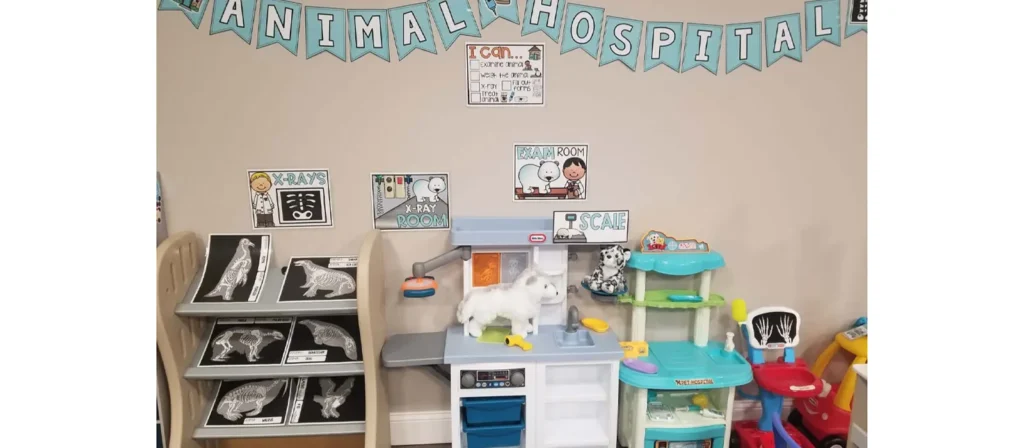
Educational Value:
This dramatic setting develops empathy, observational skills, and critical thinking as children assess and care for sick or injured animals. Veterinary vocabulary and health concepts are introduced in an age-appropriate way, and fine motor skills are sharpened through the use of medical tools and gentle handling. It encourages role identity and care-based reasoning.
13. Fire Station Dramatic Play Ideas
- Use red paper hats, a cardboard box as a fire truck, and walkie-talkies to create a dramatic fire station setup.
- Let children pretend to receive emergency calls, rush to the scene, and rescue stuffed animals from imaginary fires.
- As kids role-play, they practice teamwork, quick decision-making, and safety awareness—all vital life skills.
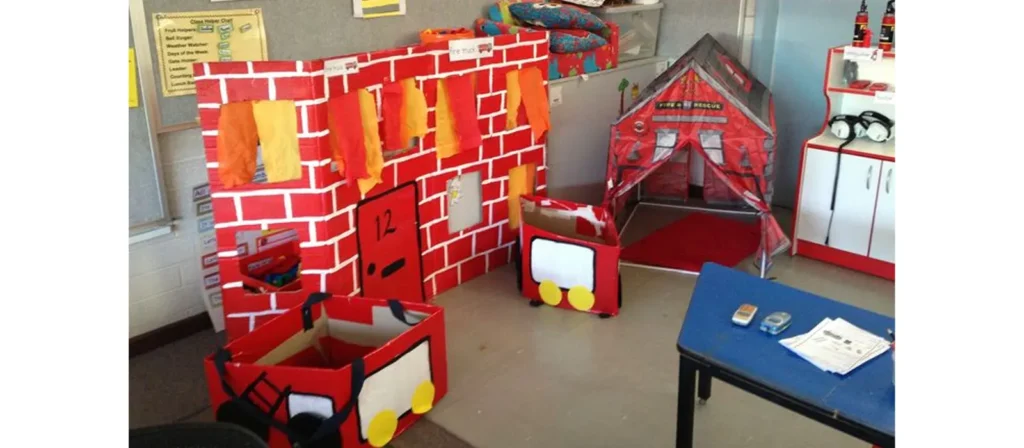
Educational Value:
Firefighter role-play emphasizes safety education, quick thinking, and physical coordination through emergency response scenarios. It supports understanding of civic duties and introduces vocabulary related to rescue equipment and procedures. Children practice leadership, cooperation, and problem-solving as they take turns acting out heroic rescues and alerts.
14. Camping Dramatic Play Ideas
- Set up a tent or blanket fort, flashlights, and a pretend campfire made of tissue paper and paper towel rolls.
- Let kids pack pretend backpacks, tell stories around the fire, or “cook” marshmallows on sticks.
- Camping play encourages storytelling, independence, and an appreciation for nature.

Educational Value:
Camping scenarios foster independence and self-regulation as children simulate setting up tents, cooking, and exploring nature. It promotes storytelling, sequencing, and imaginative thinking while offering opportunities for group collaboration and discussion. Children also gain early exposure to outdoor safety and environmental appreciation.
15. Treasure Hunt Dramatic Play Ideas
- Design treasure maps using aged-looking paper or printouts. Hide small treasures (toy coins, gems, or trinkets) around the room or playground.
- Guide kids through a series of riddles, picture clues, or directional arrows that lead them step-by-step to the hidden prize.
- This activity strengthens critical thinking, sequencing, and teamwork while encouraging kids to follow directions and stay curious.
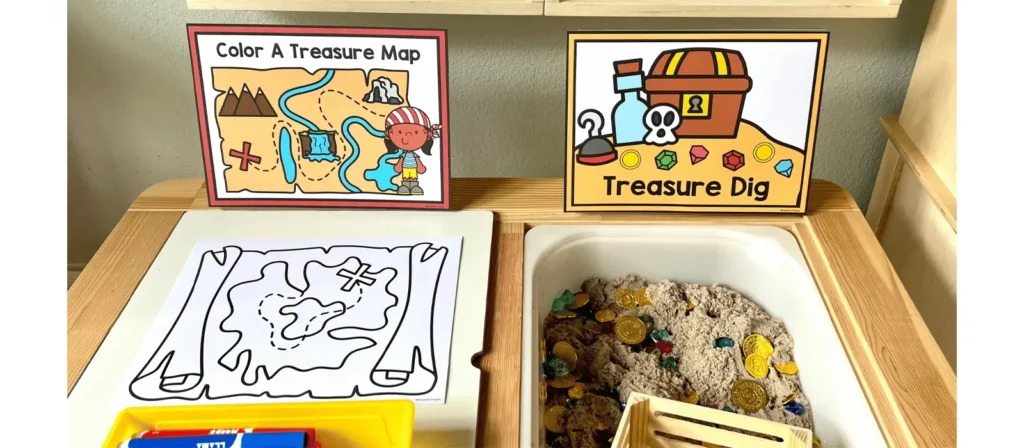
Educational Value:
A treasure hunt encourages logical reasoning, spatial navigation, and clue interpretation, building foundational problem-solving and critical thinking skills. It strengthens collaboration and communication within teams as children work toward a shared goal. The activity supports perseverance and excitement in goal-directed exploration.
16. Pirate Ship Dramatic Play Ideas
- Children develop communication, leadership, and collaborative storytelling through role-play and adventure in a high-energy setting.
- Construct a pretend pirate ship from cardboard boxes, chairs, or a blanket fort. Add paper sails, a cardboard steering wheel, and pirate hats.
- Let kids take on roles like captain, lookout, or navigator. Use toy telescopes, maps, and flags to sail for imaginary lands.
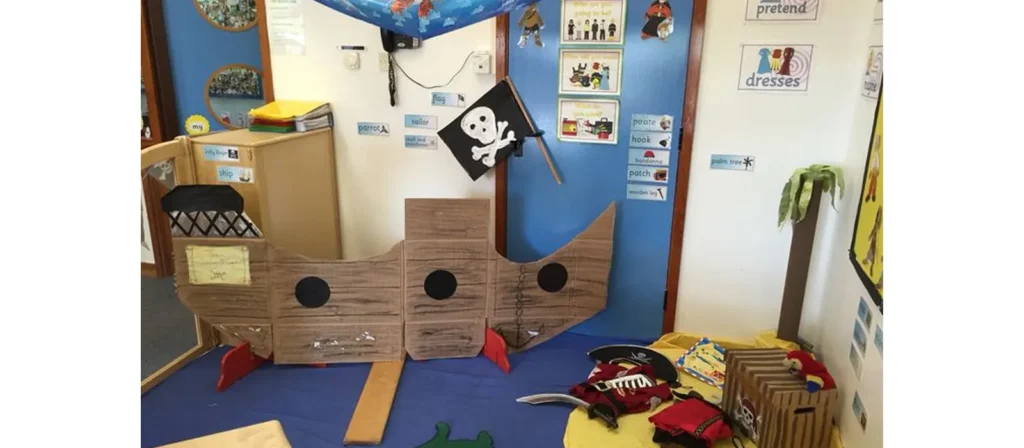
Educational Value:
Pirate play encourages creative storytelling, leadership, and collaboration as children role-play adventures and navigation. It introduces directionality, map-reading, and symbolic thinking, while also supporting expressive language through dialogue and fantasy. Group dynamics and problem-solving are naturally embedded in shared mission-based play.
17. Library Dramatic Play Ideas
- Stack books on shelves, add comfy seating or reading mats, a check-out desk, and library cards.
- Children take turns being librarians who organize books, check them out, and read stories aloud during a scheduled circle time. Others can browse and “borrow” books to read quietly.
- Kids enhance reading fluency, practice alphabet knowledge, and learn about organization, rules, and the role of libraries in a community.

Educational Value:
Library play fosters early literacy, book handling, and story sequencing as children check out, organize, and read books. It promotes understanding of library systems and roles, enhancing vocabulary and print awareness. Children also build patience and responsibility while respecting rules and taking turns in group reading settings.
18. Dinosaur Dig Dramatic Play Ideas
- Fill sensory bins or a sandbox with hidden plastic bones and fossils. Provide paintbrushes, shovels, and magnifying glasses. Decorate the area with signs like “Welcome Paleontologists!”
- Children dress in explorer vests and helmets, uncover fossils, and record their findings in a field journal or display table.
- Kids learn basic science vocabulary, hone observation skills, and experience the thrill of discovery as they mimic real-world paleontologists.
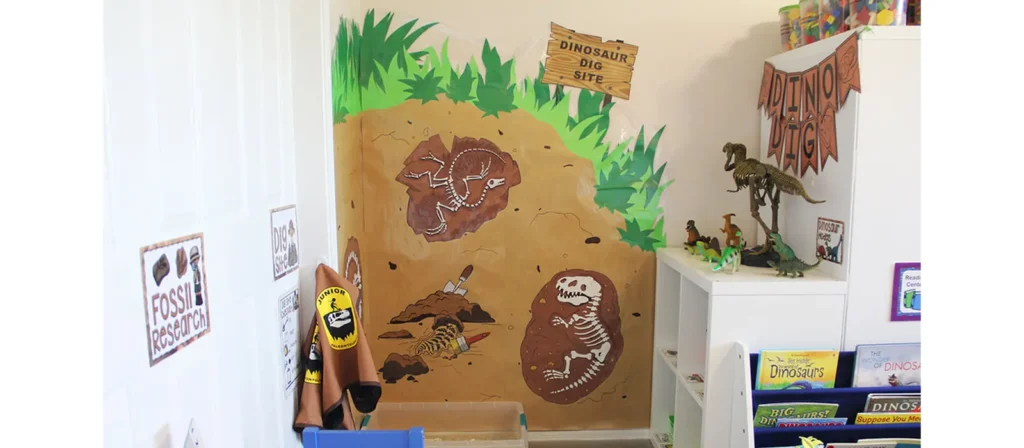
Educational Value:
Dinosaur-themed excavation introduces children to paleontology, scientific classification, and careful observation. It promotes fine motor development through the use of digging tools and enhances attention to detail during fossil discovery. Children practice documentation and reporting of findings, which supports vocabulary expansion and structured inquiry.
19. Zoo Keeper Dramatic Play Ideas
- Arrange stuffed animals in different “habitats” labeled with signs. Include props like feeding tools and caretaker uniforms.
- Children act as zookeepers, feeding animals, cleaning enclosures, and giving guided tours.
- This play encourages learning about animal care, habitats, and the importance of conservation.
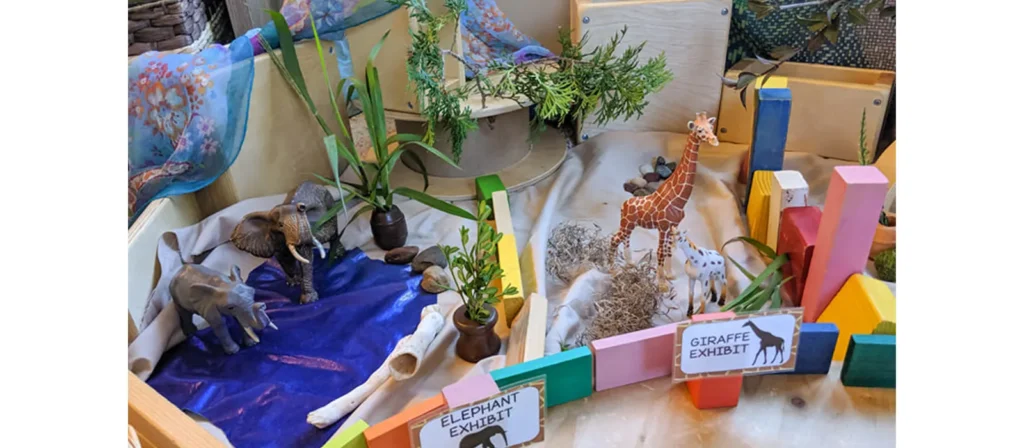
Educational Value:
Zoo keeper play supports understanding of animals, habitats, and conservation through structured caregiving scenarios. Children expand their biological vocabulary and sense of responsibility while engaging in feeding, cleaning, and habitat creation. The activity also promotes empathy and public speaking through guided “tours” for peers.
20. Weather Station Dramatic Play Ideas
- Include maps, weather symbols, thermometers, and microphones.
- Kids can role-play as meteorologists, predicting weather and presenting forecasts.
- This play improves public speaking and teaches about weather patterns and climate.
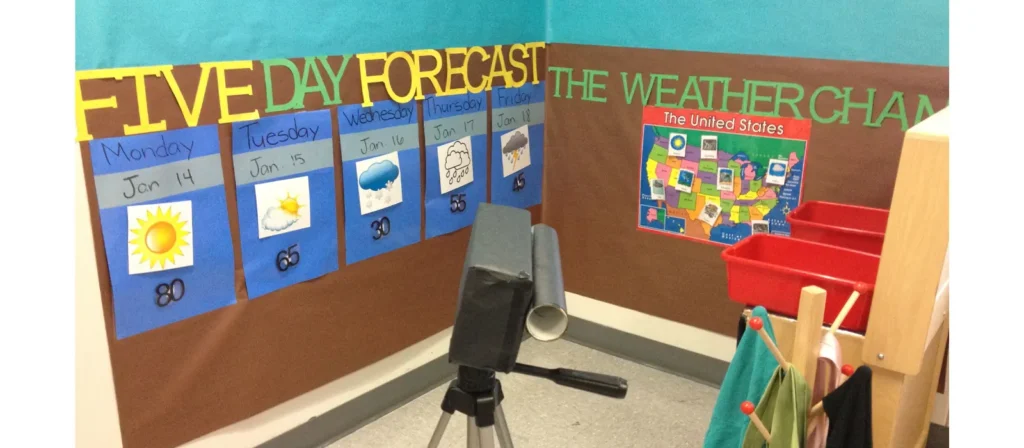
Educational Value:
Operating a weather station encourages scientific observation, data interpretation, and environmental awareness. Children learn to recognize patterns and make predictions, supporting early inquiry and analytical skills. Language development is enhanced through weather reports and symbolic representations using maps, symbols, and tools.
21. News Station Broadcast Dramatic Play Ideas
- This activity builds confidence, vocabulary, and public speaking in a fun, structured way.
- Arrange a table as a news desk, add microphones, cameras (real or pretend), and paper scripts.
- Kids can role-play as anchors, reporters, or camera operators, covering weather, breaking news, or interviews.
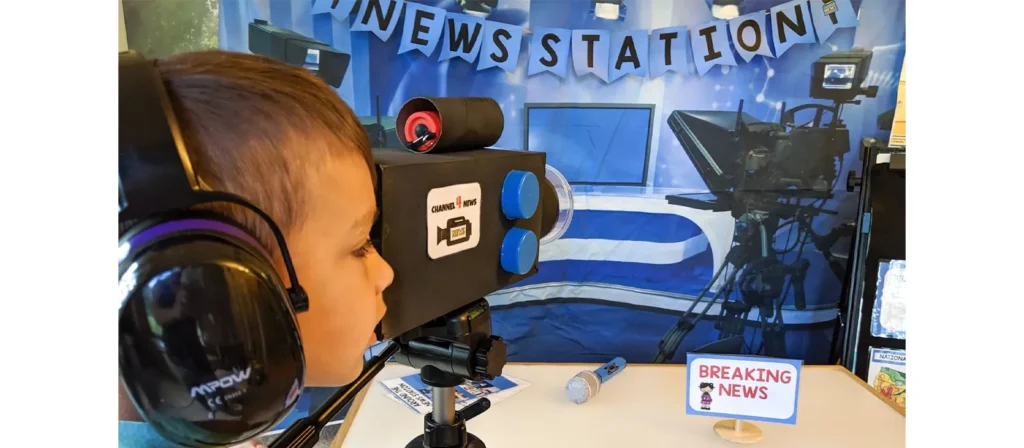
Educational Value:
Acting as news reporters or anchors strengthens expressive language, narrative sequencing, and confidence in public speaking. Children practice organizing information, summarizing events, and delivering messages. This role-play promotes teamwork and encourages awareness of current events and community happenings.
22. Movie Theater Dramatic Play Ideas
- Arrange rows of chairs, print movie tickets, and make pretend popcorn or snacks.
- Assign kids to be ushers, ticket collectors, or even performers if they want to act out a “film.”
- This helps children understand sequencing, customer interaction, and performance arts.
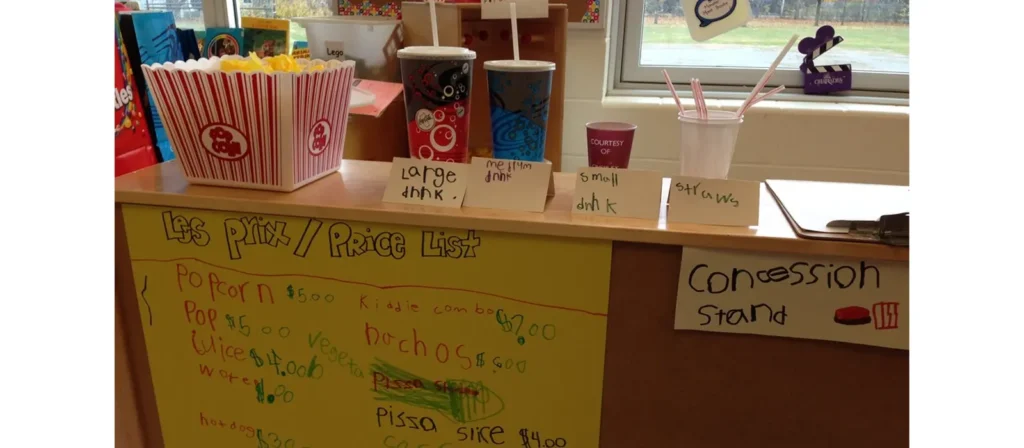
Educational Value:
Movie theater play enhances sequencing, customer interaction, and dramatic expression through acting, ticketing, and ushering roles. Children practice patience and etiquette as part of an audience, while also developing creative skills in performance and storytelling. Math concepts are reinforced via pricing and role-specific responsibilities.
23. Royal Kingdom Dramatic Play Ideas
- Create cardboard castles, add crowns, robes, and magic wands or swords made from safe materials.
- Children role-play as kings, queens, knights, or dragons with story-driven adventures and royal responsibilities.
- Kids learn social dynamics, decision-making, and storytelling in a whimsical setting.
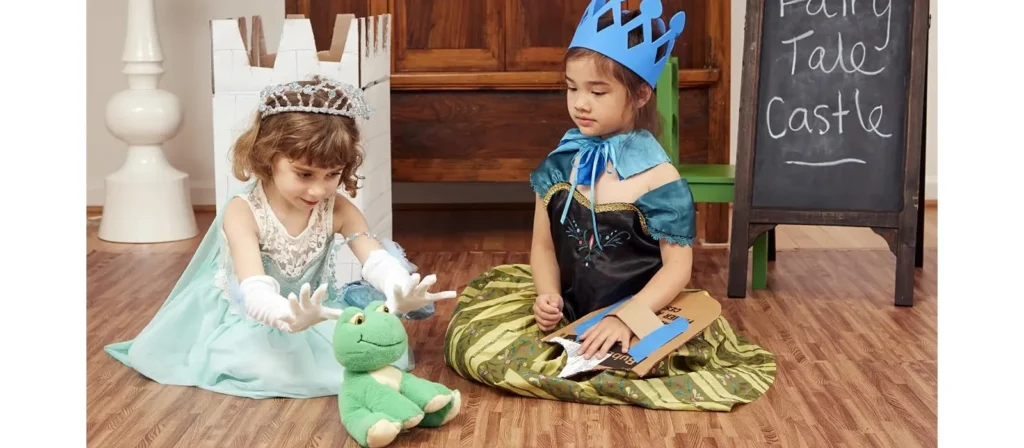
Educational Value:
Playing with royalty allows children to explore social roles, decision-making, and symbolic rule creation. It fosters rich storytelling, character development, and historical imagination. Social-emotional learning is embedded as children negotiate roles, resolve conflicts, and lead in an imaginative society.
24. Airport Dramatic Play Ideas
- Arrange chairs in rows to mimic an airplane cabin, set up a check-in counter with passports and tickets, and assign zones like “Baggage Claim” and “Security Check.”
- Kids can role-play as pilots making announcements, flight attendants serving snacks, and passengers boarding with suitcases and taking a pretend flight to various destinations.
- This play introduces children to airport procedures, geography, and global cultures while practicing waiting, taking turns, and following steps in order.
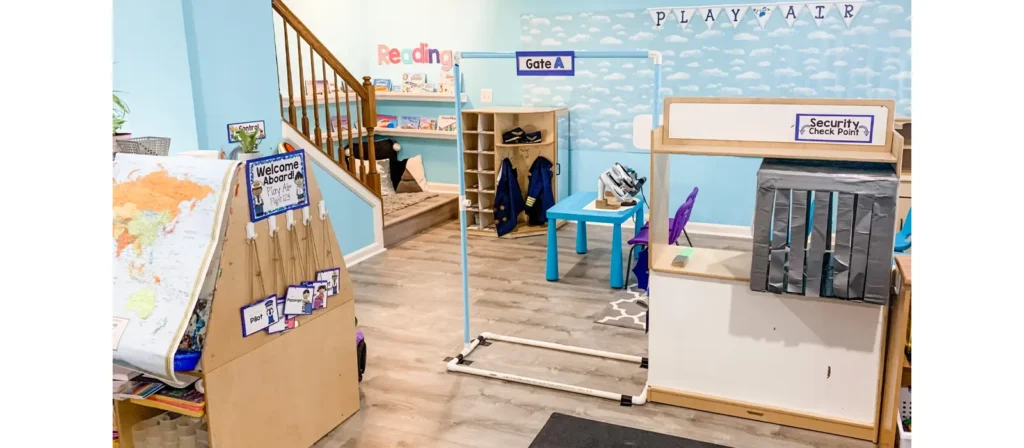
Educational Value:
Airport play introduces children to travel procedures, sequencing, and cultural geography. It supports role differentiation as they act as pilots, attendants, and passengers. The activity builds patience, order-following, and cooperation, while reinforcing functional literacy through signs, tickets, and boarding procedures.
25. Science Laboratory Dramatic Play Ideas
- Use child-sized lab coats, goggles, droppers, beakers, and colorful liquids (like water with food coloring) to set up a pretend science lab.
- Let children role-play as scientists, mixing “chemicals,” conducting safe experiments, and recording results in notebooks.
- Add charts, magnifying glasses, and observation cards to simulate real scientific procedures.
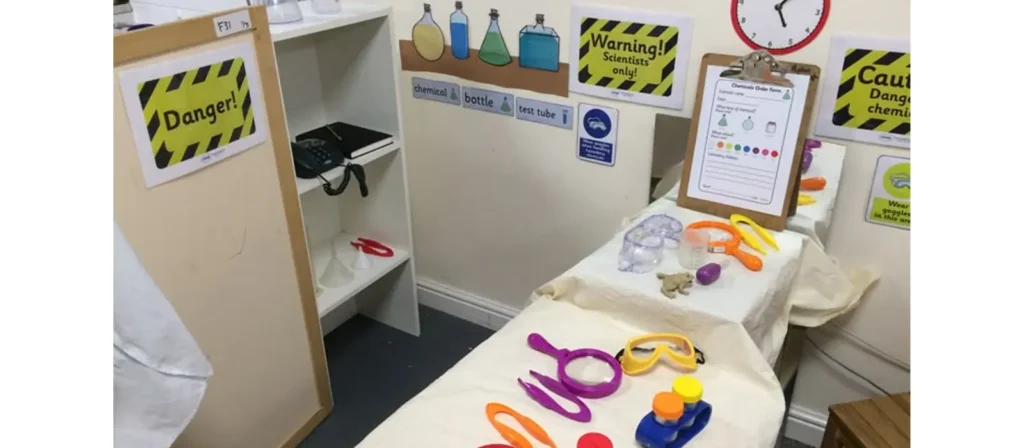
Educational Value:
Science lab play encourages inquiry, experimentation, and hypothesis formation. Children develop scientific vocabulary and logic as they explore cause-and-effect through safe, pretend experiments. Fine motor skills are refined with tools and mixing tasks, while observation and documentation practices are introduced in age-appropriate ways.
26. Music Band Performance
- Provide a variety of musical instruments such as tambourines, maracas, drums, xylophones, and keyboards.
- Allow children to take on roles as band members, singers, or conductors, and rehearse together for a performance.
- Add elements like a “stage,” audience seating, and costumes to encourage creative expression and group participation.
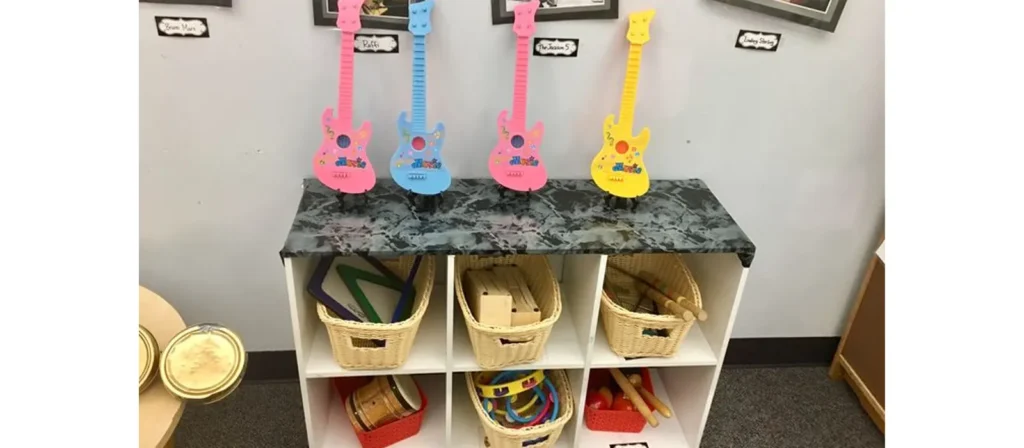
Educational Value:
Music band play builds rhythm recognition, auditory discrimination, and timing. Children practice coordination and self-expression through instruments and performance. Group music-making encourages cooperation, turn-taking, and shared creativity, while also fostering appreciation for sound, tempo, and cultural diversity.
Creating a Dramatic Play Area
A well-designed dramatic play area serves as the heart of imaginative exploration in any early childhood environment. Whether in a classroom, playroom, or home setting, this space invites children to enter new roles, tell stories, and make sense of the world around them through role-play. Below are essential components and professional tips to help you set up a vibrant, developmentally supportive dramatic play space.
1. Choose a Defined, Flexible Space
Designate a specific area for dramatic play that is separated from quieter activities like reading or puzzles. This helps children mentally shift into “imaginative mode.” Use low shelves, rugs, or curtains to define boundaries. The space should be flexible enough to accommodate rotating themes like kitchens, doctor’s offices, or space stations.
2. Provide Open-Ended Props and Realistic Materials
Stock the area with a mix of open-ended materials (like cardboard boxes, scarves, and wooden blocks) and realistic props. Items don’t have to be expensive—many can come from recycling bins or donation drives. Choose materials that can be repurposed for multiple themes to spark creativity.



3. Include Literacy and Numeracy Elements
Enhance the learning potential of your dramatic play area by embedding opportunities for reading, writing, and counting. Examples include:
- Menus, shopping lists, appointment books
- Price tags, clocks, and play money
- Maps, signs, tickets, and labels
These items help children naturally engage with academic concepts during pretend play.
4. Rotate Themes and Materials Regularly
To keep interest high and expand children’s learning experiences, change the dramatic play theme every few weeks. Involve children in deciding what the next theme should be—it empowers them and increases engagement. Some common rotations include:
- Grocery Store
- Animal Hospital
- Camping Adventure
- Weather Station
- Pirate Ship
5. Support Inclusive and Culturally Relevant Play
Ensure the space reflects a variety of cultures, family types, and community roles. Include diverse costumes, dolls with different skin tones, and signage in multiple languages. Dramatic play should provide opportunities for every child to see themselves and others positively represented.
6. Prioritize Safety and Cleanliness
All props and furniture should be age-appropriate, non-toxic, and free of sharp edges. Regularly check for wear and tear and sanitize frequently touched items. Use soft furnishings, rounded corners, and ensure easy access to prevent accidents and promote independence.
Send us a message if you have any questions or request a quote. Our experts will give you a reply within 48 hours and help you select the right product you want.
Overcoming Challenges in Dramatic Play Ideas

1. Lack of Resources or Materials
One of the most common challenges in dramatic play is the lack of materials to support the activity fully. Whether it’s missing props, costumes, or play items, children might struggle to engage in specific scenarios without the right tools.
Solution: Get creative with the resources you already have. Household items like cardboard boxes can turn into stoves, refrigerators, or cars. Old clothes can be repurposed as costumes, and simple toys like wooden spoons or plastic containers can be used for cooking or grocery shopping. Additionally, encourage children to create their materials. For example, they can make their menus, price tags, or even flowers out of paper or fabric. This solves the material issue and fosters creativity and problem-solving skills.
2. Short Attention Spans
Young children often struggle to stay engaged in a dramatic play scenario for extended periods. They may switch roles frequently or lose interest in the activity altogether.
Solution: Keep the play sessions short and dynamic. Break the activities into manageable segments so children can transition smoothly between roles or scenarios. For example, instead of having them act as cashiers for 20 minutes, rotate them through different roles every few minutes. This keeps things fresh and exciting. You can also introduce new elements mid-play (like a surprise customer or a “special delivery”) to spark interest and maintain engagement.
3. Conflict Among Children
Because dramatic play often involves shared spaces and roles, conflicts between children can arise. Disagreements over who gets to play which role or how the game should unfold can disrupt the flow of the play.
Solution: Encourage children to collaborate and negotiate roles. Establishing clear ground rules, such as taking turns or sharing props, can also help prevent conflicts. When disputes arise, guide children through problem-solving strategies, like asking them how they can resolve the issue together or suggesting a new role to try. Social-emotional learning is at the heart of dramatic play, so using these moments to teach empathy, respect, and teamwork is important.
4. Limited Social Interactions
While dramatic play encourages social skills, some children may struggle to interact with peers during these activities. They might feel shy, intimidated, or unsure how to engage with others.

Solution: Set up the dramatic play scenario to naturally encourage group participation. For instance, instead of having one cashier and one customer, set up a larger grocery store or restaurant where multiple children can take on different roles simultaneously (e.g., cashier, customer, stocker, manager). This encourages children to interact in a less intimidating environment. Additionally, scaffolding the play by suggesting dialogue or prompts can help children who are hesitant to speak or take the lead.
5. Difficulty with Role-Play in
Children might find it challenging to take on specific roles during dramatic play. They may not know how to act like doctors, chefs, or teachers or feel unsure about their responsibilities within the play scenario.
Solution: Provide simple role cards or scripts outlining each role. For example, a “doctor’s role card” might include phrases like “How are you feeling today?” or “Let me check your temperature,” which will guide children in their role-playing. Modeling behaviors and providing real-life examples, such as pretending to be a customer at a restaurant or a teacher in a classroom, can also help children become characters. Creating a safe environment where they feel comfortable experimenting with different roles without fear of making mistakes is essential.
6. Overwhelmed by Choice
Dramatic play often presents numerous options, which can sometimes overwhelm children. They may not know where to start or struggle to choose from many roles and scenarios.
Solution: Narrow down the options and create more structured play setups. For example, if you have a restaurant theme, you can suggest roles like “chef,” “server,” or “customer” to focus the play. You can also guide children by introducing new scenarios step by step. Instead of presenting them with a wide-open “construction site,” you might first focus on building a specific structure, such as a house or a bridge, and then expand the play as they become more comfortable.
7. Over-simulation or Under-simulation
Some children may find the environment too busy, overwhelming, quiet, and under-stimulating. The level of stimulation can make dramatic play less enjoyable or productive.
Solution: Balance the level of stimulation in the play area. If it’s too chaotic, try simplifying the environment by reducing the number of props or minimizing distractions. If the space feels too quiet, add new elements like background music, new scenarios, or more props to engage the children. The key is ensuring that the space feels right: not overwhelming but stimulating enough to encourage imagination and learning.
8. Missed Learning Opportunities
Without adult guidance, children might not always make the most of the educational opportunities that dramatic play provides. They may get so caught up in the fun that they miss chances to practice key skills like counting, communication, or following directions.
Solution: As a teacher or facilitator, gently guide the play without taking over. Ask open-ended questions such as, “How many apples do you want to buy?” or “What will you do first when you arrive at the doctor’s office?” This encourages children to think critically and reinforces learning objectives. You can also introduce educational props (like play money or recipe cards) that challenge children to use literacy, math, and problem-solving skills during the play.
9. Inconsistent Participation
In a group setting, not every child may want to participate in dramatic play, and some may resist taking part, especially if they are unfamiliar with the theme or feel disconnected from the activity.
Solution: Encourage reluctant children by introducing more familiar elements. For instance, if the theme is “restaurant,” but a child is unsure, you could start with something they are familiar with, like “home cooking,” and slowly guide them into more elaborate role-playing. Create an inviting atmosphere that makes all children feel welcome and comfortable to join in, even if it means starting with a brief demonstration or smaller groups.
Frequently Asked Questions About Dramatic Play
- What is another word for dramatic play?
Dramatic play is often referred to as pretend play, imaginative play, or role play. These terms are used interchangeably to describe activities where children act out scenarios using their imagination and social understanding. - At what age should children start engaging in dramatic play?
Children as young as 18 months begin to imitate simple actions, like pretending to talk on the phone. Around age 2 to 3, they enter the symbolic play stage, where they start creating structured pretend scenarios. By preschool age (3–5 years), dramatic play becomes more complex, incorporating storytelling, collaboration, and themed environments. - What are some examples of dramatic play settings?
Common dramatic play settings include pretend kitchens, grocery stores, doctor’s offices, post offices, restaurants, science labs, construction zones, music stages, and more. These scenarios mimic real-life environments or imaginative worlds (like pirate ships or royal kingdoms) and provide opportunities for diverse developmental benefits. - Can dramatic play be integrated into academic learning goals?
Absolutely. Dramatic play supports multiple academic domains: math (through pricing, counting, measuring), science (via experimentation, observation), and literacy (through signs, lists, role-based communication). With intentional planning, educators can align play scenarios with curriculum standards while keeping learning playful and child-centered. - Is dramatic play still valuable for older children (ages 6+)?
Yes. While the style of play becomes more narrative and structured, older children still benefit from role-play in the form of skits, creative writing, mock interviews, or historical reenactments. It continues to support empathy, communication, perspective-taking, and even leadership skills, especially when integrated into project-based learning. - How do children’s roles evolve during dramatic play?
Younger children often imitate familiar routines, while older children create more complex narratives, assign roles, and develop rules or scripts. Role flexibility also increases, showing cognitive growth and social maturity.
Conclusion: Unlocking the Power of Imagination
Dramatic play is a powerful tool for fostering children’s creativity, learning, and personal growth. Whether pretending to be gardeners, doctors, or shopkeepers, these imaginative roles provide fun and promote critical developmental skills. Through role-playing, children explore new concepts, practice problem-solving, and engage in meaningful social interactions.
Imagination is not just about fun—it’s the key to developing empathy, confidence, and problem-solving abilities. By nurturing this creativity, we are helping children become well-rounded, thoughtful, and curious individuals, ready to navigate the world with confidence and compassion.




